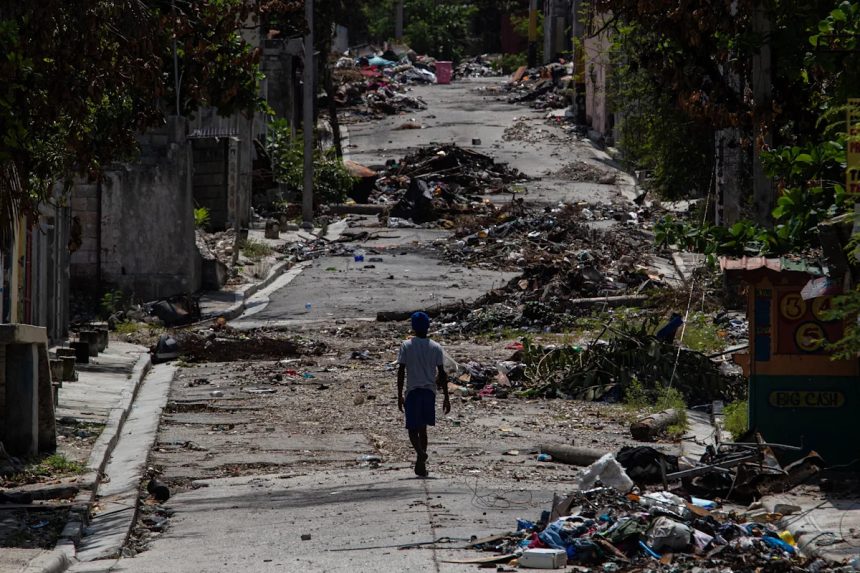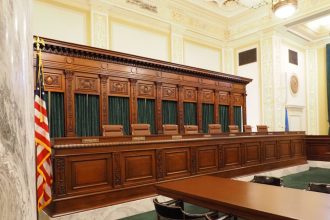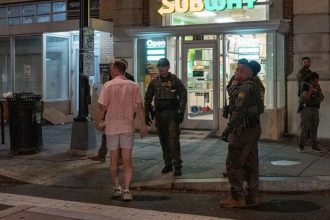The United Nations Security Council has voted to expand an international security force deployed to Haiti and transform it into a so-called “Gang Suppression Force”.
The resolution passed by the council on Friday provides a clear mandate for the force to work with local authorities to “neutralise, isolate, and deter” gangs, secure infrastructure, and seek to secure institutional stability. It would raise the personnel ceiling from 2,500 in the current mission, first approved in 2023, to 5,550 personnel.
The resolution also requests that the UN secretary-general establish a UN Support Office in Haiti to provide increased logistical support amid the Caribbean nation’s overlapping security, humanitarian and political crises.
“The result today allows us to have the necessary reconfiguration on the ground in order to face the gangs and, therefore, address the insecurity situation in the country,” Panama’s Representative to the UN Eloy Alfaro De Alba said following the vote.
“Today, we say to Haiti that, once and for all, you are not alone,” Alfaro De Alba said.
Panama and the United States first introduced the latest resolution in August. It passed on Tuesday with 12 votes in favour and none against. Permanent Security Council members China and Russia, along with rotating member Pakistan, abstained from the vote.
Following the vote, Russian envoy Vassily Nebenzia said “the tools of international assistance to Haiti” previously approved by the Security Council had “failed to produce any sustainable results”.
He criticised the resolution for having a “virtually unrestricted mandate to use force against anyone and everyone labelled with the vague term ‘gangs’”, while further calling the plan “ill-conceived and rushed”.
Haiti has a controversial history when it comes to foreign intervention, particularly in light of rampant sexual abuses committed by peacekeepers deployed in the wake of Haiti’s 2010 earthquake. The forces were also responsible for a cholera outbreak that killed about 10,000 people.
But speaking last week, during the United Nations General Assembly General Debate, Laurent Saint-Cyr, the current chairman of the Transitional Presidential Council of Haiti, voiced support for a new force, noting that the Kenyan-led security support mission deployed for more than 15 months in the country remains woefully understaffed and underfunded.
Fewer than 1,000 police officers have been deployed under the mission, which is officially set to end on October 2, despite an initial pledge of 2,500. Nearly all of the capital, Port au Prince, remains under the control of powerful gangs.
“It is a war between criminals who want to impose violence as the social order and an unarmed population struggling to preserve human dignity,” Saint-Cyr said.
According to the UN, at least 1.3 million Haitians remain internally displaced due to violence, with 5.7 million facing food insecurity. At least 3,100 people have been killed in violent incidents between January and June 2025. At least 2,300 grave violations against children have been recorded.
The country is also in the midst of a political crisis that began with the assassination of President Jovenel Moise in 2021. A general election has been repeatedly postponed amid the unrest.
On Tuesday, acting Haitian Prime Minister Alix Didier Fils-Aime hailed the resolution’s passage.
“This decision marks a major step forward in the partnership between Haiti and the international community,” he said.
Rights observers have also offered tentative support for a renewed international mission to Haiti, with Human Rights Watch last week saying any operation must have reliable funding and human rights safeguards.
The resolution passed on Tuesday does not provide specific details on such safeguards, including clear rules of engagement, saying instead that parties must work to establish those rules in line with “Haiti’s sovereignty and in strict compliance with international law”.
Like the Kenyan-led mission, the new Gang Suppression Force will also mostly rely on often unpredictable voluntary contributions from UN members.









